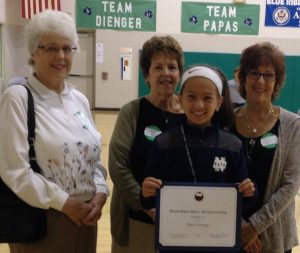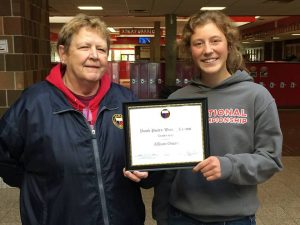With the annual National Youth Writing Contests, GFWC offers young writers the opportunity to find their voices. Writing is a wonderful practice and talent worth fostering, especially in children who can use it to discover themselves and their own potential.
Nora Halder, the winner of this year’s Category 4 Youth Short Story Contest, was entered through GFWC Seward Woman’s Club (Nebraska). GFWC Nebraska started a creative writing program in 1970, and it has continued to this day. Initially, it was only for GFWC members, but when the national organization included the youth, the clubs began to include the youth in their contests as well. For the past fourteen years, the clubs have held a writing workshop for students and adults, and there are usually 50 to 60 people, mostly students, in attendance. Nora Halder, now a senior at Seward Senior High School, has attended the writing workshop each year since she was a freshman, and values the chance to write and participate in the contest.
The Fine Arts and Creative Writing Chairman for Nebraska, Betty Jean Kolterman, encourages the clubs to notify schools of the writing contest, and at least nine clubs faithfully provide entries. GFWC Nebraska also prints an anthology that includes the writing of Nebraska students and clubwomen to celebrate and share their work.
The 3rd-5th grade winner of the Youth Short Story contest was Mary Arengo, and she was entered by GFWC Montgomery Woman’s Club (Ohio).

Mary Arengo, pictured with members, from left to right: Ruth Harrison, Claire Hounchell, and Nancy Jones.
The club has sponsored the contest since their founding in 1952. They promote the contest by sending information to every school in the district. They are fortunate to have enthusiastic English teachers who encourage their students to submit, and so the club receives between 400 and 500 entries every year. The first, second, and third place winners receive a certificate, as well as a Barnes and Nobles gift card to encourage reading and writing. Winners at the state level are invited to join the club in the Montgomery 4th of July parade, and participants are given a “cone card” for an ice cream cone at the local ice cream parlor.
Sophomore student Alison Oman won her age group’s poetry contest, submitted by GFWC Amery Woman’s Club (Wisconsin). Alison is active in sports, particularly tennis, and the group presented her with her award at school to accommodate her busy schedule. The club works with Amery Public Schools and the Home Schooling group that meets at the local library to encourage youth submissions.

Alison Oman pictured with Gloria Lansin
GFWC Woman’s Club of Rock Hill (South Carolina) has been having a writing contest for over thirteen years. Chloe Powell, the nine year old winner of her short story age division, is the granddaughter of one of the club’s members. She wrote the story for school, and the club was very impressed with it. The club is planning a “Tea and Topics” event in the fall where Chloe will be reading her story. The club has a strong Education CSP group and is made up of many former teachers, and so they encourage their families to submit writing. Club President Geri Rinehart said, “[We consider] our Chloe winning this award to be a truly amazing honor and we were so thrilled.”
Gabby Hall, who won the Youth Poetry Contest in the K-2nd grade age group, was entered through GFWC Alma Ladies Reading Circle (Kansas). Arlene Gnadt, the writing contest organizer for club, is a retired third grade school teacher who was approached many years ago by the group’s former President Veryl Meseke to have her students participate. Arlene said it was a great way for her students to practice their writing skills with a purpose. The students kept a journal for a week, and when contest time came, they each selected one poem and one story to submit.
After retiring, Arlene and the group’s new president, Diane Barrett, prioritized promoting the contest by visiting other classes and schools to encourage them to participate. The club gives monetary prizes for the top four winning entries in each category and grade level. Arlene says, “It is always exciting to see the students’ faces light up when they are given this award.” In addition, they celebrate the winners by publishing pictures and winning works in the local newspaper.
GFWC hosts the youth contests to inspire children to pick up a pencil and express themselves, but it’s the clubwomen who encourage it in their communities. “We don’t want teachers to see this contest as additional work, but as an opportunity to expose their writers and encourage a joy for writing,” Arlene said. GFWC hopes clubwomen continue spreading that joy for writing.
To learn more about the GFWC’s writing contest, visit our club manual.

